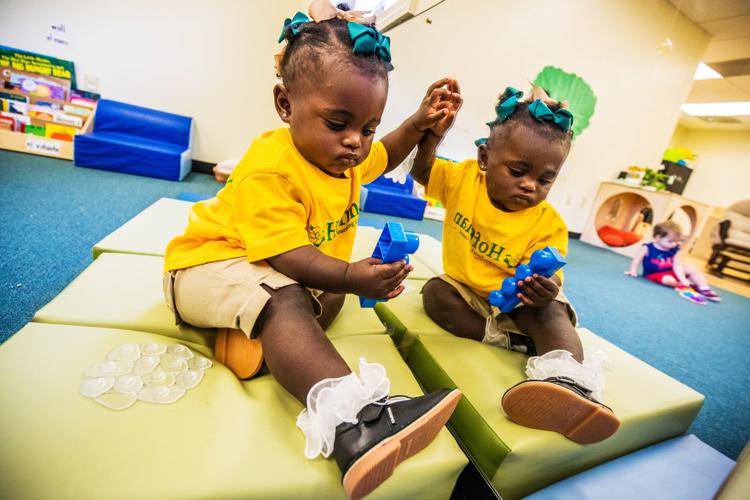The New Orleans City Council’s move to spend $1.5 million on public day care has landed it in hot water with Mayor LaToya Cantrell, who said the decision is unwise given the strain the coronavirus has placed on the city’s finances.
The council voted unanimously on Thursday to pull $1.5 million from the city’s fund balance and spend it on early childhood education, fulfilling a promise it made after the 2020 budget was finalized and heartening advocates who said it would help daycare programs continue uninterrupted during the coronavirus pandemic.
Following a months-long campaign by early childhood education advocates, the New Orleans City Council on Thursday approved a city budget that …
Budget committee chairman Jared Brossett, who authored the measure, said day cares have waited for months for the city to make good on its promise of $3 million in total funding. The $1.5 million is the last half of that money, he said.
"Given the financial strains families are facing with COVID, this funding is especially critical for our children and our families," Brossett said. "Parents, children and advocates have waited patiently, and ... it’s already July, and I don’t think there can be any more delays."
But Cantrell’s Chief Administrative Officer Gilbert Montaño warned during the council's virtual meeting that pulling the money out right now would imperil the government's financial health, and Cantrell called the move “irresponsible” in a statement issued after the meeting.
“It puts the city in an untenable position and places an unreasonable demand on the general fund in the current circumstances,” Cantrell said. “We look forward to working with the council on developing alternate funding strategies, and to bringing the legislative language in line with the undeniable realities on the ground.”
The deal is done and New Orleans has its $726 million budget in hand for 2020.
The $1.5 million rounds out a total $3 million commitment for 2020, the largest ever made by the city for early childhood education and one that is reflective of a tighter focus by Cantrell and the council on the city's youngest learners.
The city has been funding those students since 2017, when officials reserved about $750,000 after advocates pleaded for more help in closing the achievement gap between low-income children and their higher-income peers, whose families can typically afford private day care programs.
The city doubled that investment to $1.5 million in 2018, expanding the number of spots in its “City Seats” program from 50 to 112. And after budget negotiations last year, Cantrell and the council agreed to again double their investment and fund 150 seats after a campaign by advocates.
One-year-old Jaci May clutched a plastic slice of bread as she played in the toy kitchen at Wilcox Academy of Early Learning with her teacher,…
Since then, however, the pandemic has changed the city's financial position.
But while officials predicted this spring that a drastic decline in tourism would cause a sales tax slump that could lead to a deficit of anywhere from $130 million to $170 million by the end of the year, the city's financial picture is somewhat brighter than they expected, at least thus far.
As of May, according to a city budget presentation last week that was initially reported by The Lens, New Orleans has collected roughly the same amount in revenue that it did last year. That's largely because of increased property tax collections due to rising home values in last year's assessment; sales taxes are actually below where they were last year.
Sredericka Rodriguez, a 30-year-old employee of the Salvation Army, knows firsthand what a struggle it can be to pay for child care in New Orleans.
The city is also benefiting from about $93 million in federal CARES Act funding that will help make up other declines in sales tax revenue through the end of the year. Cantrell withdrew a request to take out a $100 million line of credit to cover expenses for that reason, her Chief Financial Officer Norman White said earlier this month.
But because the federal relief is coming in spurts, the city is trying to keep a strong credit profile and because it needs to ensure that it can fund its own operations, so the money the council approved is a bad idea right now, Montaño said.
"Of course, we are going to honor the commitment of the $1.5 million," he said. "It would just be far more beneficial for the council and the administration not to pull it from fund balance, simply because if we were at this stage in July, it would draw on a negative fund balance."
What Montaño described as the city's fund balance is separate from the city's rainy day fund, which was at roughly $30 million as of March and can only be tapped after natural disaster, economic recession or federal mandate.
But day care advocates urged the city to deliver the $1.5 million payment that Cantrell’s administration vowed last year to reserve.
New Orleans officials are considering once-a-week trash pickup, a halt to curbside recycling and layoffs in several departments as they seek t…
"This pandemic has highlighted the need for quality and affordable child care," said Sonjia Brown-Joseph, director of Clara’s Little Lambs Preschool Academy in Algiers. "Parents cannot work without it. Your support could be the difference between a childcare center staying open and having to close."
Of the 125 children served across three locations of Wilcox Academy of Early Learning, 24 are City Seats students, according to Wilcox owner and executive director Rochelle Wilcox. She said the city's money pays for 12 of her staffers.
Brossett added that conversations with Montano's office about making Wilcox, Brown-Joseph and other day care directors and children whole have been ongoing since before the pandemic.
"Everyone always talks about the importance of our children, and the need to invest in the future of them and our city," he said. "I just believe it’s our time to act and fulfill that commitment."
















